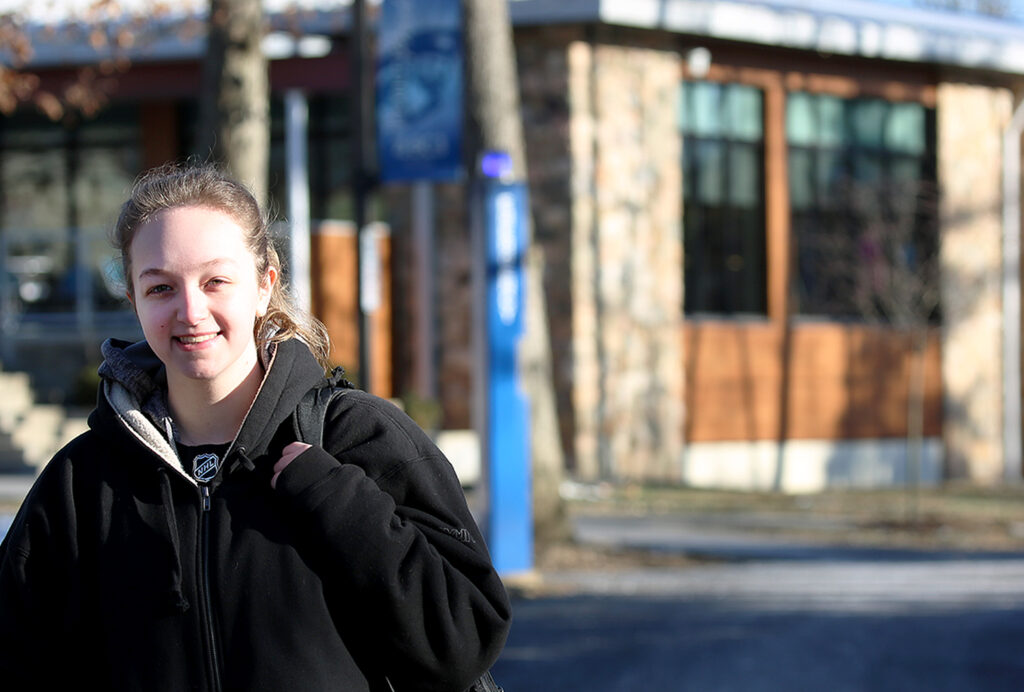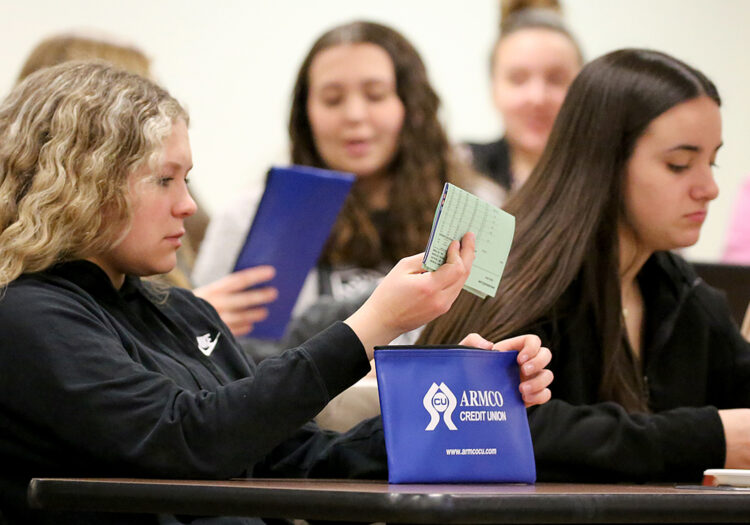(Butler, PA) The average debt for Generation Z in the United States – those ages 18 to 23, according to a cnbc.com report in October – is just over $16,000, and for their immediate elders, the millennials, almost $87,500.
A Butler County Community College financial literacy course stresses the importance of budgeting, saving, investing and comparing career choices to financial decisions.
Nearly 40 Butler Area Senior High School seniors this spring are taking BC3’s financial literacy course on BC3’s main campus as part of an inaugural dual-enrollment Early College Pioneers program that debuted in August.
“I had no idea what this class was,” Early College Pioneer Delaney Dunmire said. “We were all kind of looking the class up. ‘What is this?’ We had never heard of it before.”
Financial literacy is important because high school students are preparing for their future, said Julianne Louttit, BC3’s director of financial aid. Louttit and Sherri Mack, BC3’s interim dean of business, instruct the one-credit financial literacy course to the Early College Pioneers on Friday mornings.
“I had no idea what this class was. We were all kind of looking the class up. ‘What is this?’ We had never heard of it before.”
Delaney Dunmire, BC3 Early College Pioneer
“A key piece of the course is understanding student loans,” Louttit said, “and financial aid at all types of colleges.”
U.S. millennials, those ages 24 to 40, according to cnbc.com in October, owe an average of $39,000 on student loans. That’s about half of their nearly $87,500 average debt.
High school students need to understand the return on investment of their career choice against the student-loan debt they can accrue, Louttit said.
“With a four-year degree in some fields, you may be starting at a salary of around $50,000,” Louttit said. “There are all kinds of tools and resources to review based on different careers. Does it make sense to have $80,000 in student-loan debt when you are going to start at a salary of $50,000 and when that four-year degree can be made more affordable by starting at a community college, then transferring?
“It’s not that I try to scare them. But they do need to see the reality.”

Student-loan debt “detrimental”
The average student-loan debt for Pennsylvania’s Class of 2019 was $38,521, according to an April 2021 report in LendEDU, a website that provides comparisons for loans, credit cards and other financial products.
“It definitely prolongs their ability to move out on their own,” Louttit said. “Some students are coming back home from college and it’s not affordable to get out there and live because of that student-loan payment.”
Seventy percent of BC3’s Class of 2021 graduated debt-free.
Student-loan debt, Early College Pioneer Madison Weiland said, “is detrimental. It’s really bad. That’s why I’m going to BC3. It would be stupid not to take your general credits here, and then transfer. Some of the teachers that we have had here also teach (at a regional private institution). It’s the same class, but different prices.”
In addition to student-loan debt and comparing career choices to financial decisions, Early College Pioneers in BC3’s financial literacy course have learned about, among other topics, accrued interest, automobile loans, credit cards, mortgages and scholarships.
Student-loan debt “is detrimental. It’s really bad. That’s why I’m going to BC3. It would be stupid not to take your general credits here, and then transfer."
Madison Weiland, BC3 Early College Pioneer

Understand “the commitment”
Tony Shakely earned an associate degree from BC3 and a bachelor’s degree from Slippery Rock University of Pennsylvania. He is a commercial loan officer at Armco Credit Union.
The board chair of the BC3 Education Foundation discussed financial literacy with Early College Pioneers in March.
“I think it is important that the student understand completely the obligation that they are tying themselves into with a student loan,” Shakely said. “It’s very easy in high school to talk about going to college and all these grand plans. It’s another thing to sit down and calculate what those monthly payments are going to be for 10, 20 or even 30 years beyond graduating.
“I don’t think for most kids they understand the commitment that is going to be involved.”
Dunmire does. Payge Kirmeyer does. Darby Miller does.
“Most of the people who I have talked to who have gone to college actually go to BC3,” said Dunmire, who plans to enroll at BC3 this fall. “They know that college debt can be bad … and they are glad that they went here.”
BC3 tops in salary-to-cost ratio
Early College Pioneers Kirmeyer and Miller also plan to enroll at BC3.
“The less debt I have from BC3, one, I can pay it off more quickly and two, whenever I go to move out, I don’t have debt blocking me from being able to get a house or a different car or another loan,” Kirmeyer said.
“My brothers are both in college, so I know how the interest (on student loans) can add up,” Miller said. “Financial aid does help, but there is still a lot of debt.”
BC3 had the highest ratio of graduates’ salaries 10 years after commencement for every dollar a student pays to attend BC3, besting ratios at 41 other Pennsylvania, West Virginia and Ohio colleges and universities whose U.S. Department of Education information was analyzed in 2018 by the Pittsburgh Business Times.
Dunmire and her classmates now understand the financial literacy course, she said.
“We’re coming up on college very soon,” Dunmire said. “It’s right around the corner. So all of these things that we haven’t gotten the preparation for, we’re finally getting. We’re learning how we are going to have to take care of these loans. How we are going to help prepare for them. How we should save for them. These are things we should look into. Instead of going straight to a big university, try a community college to help with those costs.”
Butler High Early College Pioneers can earn 14 free college credits in a program supported by the Butler Area School District, the BC3 Education Foundation and the Benedum Foundation.





